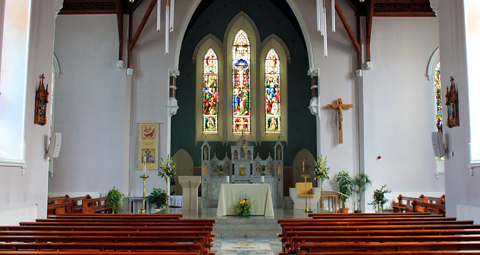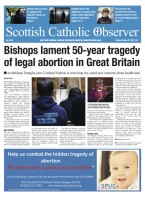October 20 | ![]() 0 COMMENTS
0 COMMENTS ![]() print
print

The laity must make life easier for the clergy
HUGH DOUGHERTY on a busy parish with a shortage of priest power — By HUGH DOUGHERTY
I found myself in the Co Donegal, Atlantic coast resort of Bundoran recently, for the first time in many years, having been invited to speak at the town’s railway heritage festival. The event marked the closure of the town’s railway and the end of the famous ‘Bundoran Express’ on September 30, 1957.
That was when the unionist Stormont government forced the closure of the cross-border railway, cutting off the town from its main trade—holidaymakers from Glasgow, Belfast and Dublin—and seeing off, too, the trains which took thousands of pilgrims to Pettigo Station, where they transferred for buses to St Patrick’s Purgatory at Lough Derg.
I made the epic journey by steam train with my parents and sister all the way from Belfast to Bundoran in June 1957, and it was that journey that I recalled when I gave my talk at the railway heritage festival.
I recalled everything from seeing the famous Fintona Horse Tram, to the customs men at the border, not forgetting changing trains at Bundoran Junction and being frightened by the Royal Ulster Constabulary policemen, who waved Sten guns at us as we crossed the border into Donegal.
Then there was Sunday Mass in 1957. This was Éamon De Valera’s Ireland at its height, with Church and State hand-in-hand. Bundoran was awash with priests, nuns and Christian Brothers on holiday.
There were black suits and habits of the pre-Vatican II type, with the good Sisters sporting a huge variety of outrageous headgear that must have needed wing mirrors to allow the nuns to see where they were going.
Vocations there were by the score in Ireland then—it must have been a good career option. The nuns also took over the west end swimming pool at certain times of the day, and we, mere mortals, were banned, less we see the good ladies at play.
On Sundays, not only was church packed with the latest influx of holidaymakers from Glasgow, Belfast or Dublin, but the nuns and brothers were packing the pews too.
A constant stream of priests celebrated Mass more or less continuously until early Sunday afternoon, with a tsunami of altar boys—no girls then—accompanying them to and from the high altar, as the priests rattled through the Latin of the Mass in record time.
Meanwhile, other priests celebrated private Masses at side altars as the congregation, totally detached from it all—Latin Mass lovers take note about how it really was—proved the statistics that nearly 100 per cent of Irish Catholics attended Sunday Mass in 1957.
Today, 60 years later, how is Bundoran faring? Having slumped after its railway closed and holiday habits changed, it’s reinvented itself as the surfing capital of Ireland. The boarding houses of the 1950s have given way to self-catering, good hotels and caravan sites. The town’s population has grown by one third over the last 30 years, and better roads and express bus services have allowed commuting to Derry and Sligo.
How is the Church managing among all of this, especially given the scandals and difficulties of the past, and in Taoiseach Leo Varadkar’s brave new Ireland of same-sex marriage and an abortion referendum?
Surprisingly, when we went along to the Church of the Immaculate Conception (above) for 11am Sunday Mass, it was really full, and there was a very good spread of age ranges in the congregation. It was encouraging to see. Perhaps, Catholic Ireland was still alive and well in Bundoran.
But parish priest Canon Ramon Munster had some bad news. His curate, who looked after the other church in the parish, St Joseph’s in Ballyshannon, had been granted extended leave, leaving the canon, who told us he was in his 70th year, to look after everything.
“People rightly expect good service from their priest,” he said. “But this is one of the few professions in which a man of my age would be asked to do what I’m being asked to do. There’s all the administration that you don’t see, the phone constantly ringing, and the fact is that most parishes in the Diocese of Clogher are in the same position as we are, with their priests reaching retirement age.”
So just like home then, with a dearth of vocations, an ageing workforce, and an appeal from the canon to ask the laity to take over the admin from him, but a request which raises the question, all these years after Vatican II, as to why the laity hadn’t been doing just that for the last several decades.
I hope the canon and his flock find a solution, for here was a busy parish with faithful parishioners attending Mass against all the Irish odds, but short on priest power, and with an extra Mass on during the summer to cater for visitors, seeking a solution is vital.
It’s a dilemma we know only too well across Europe, but if Bundoran can re-invent itself as a town, then we need to do the same, and make it much more attractive for men to join the priesthood. The good canon simply can’t do it all on his own.











